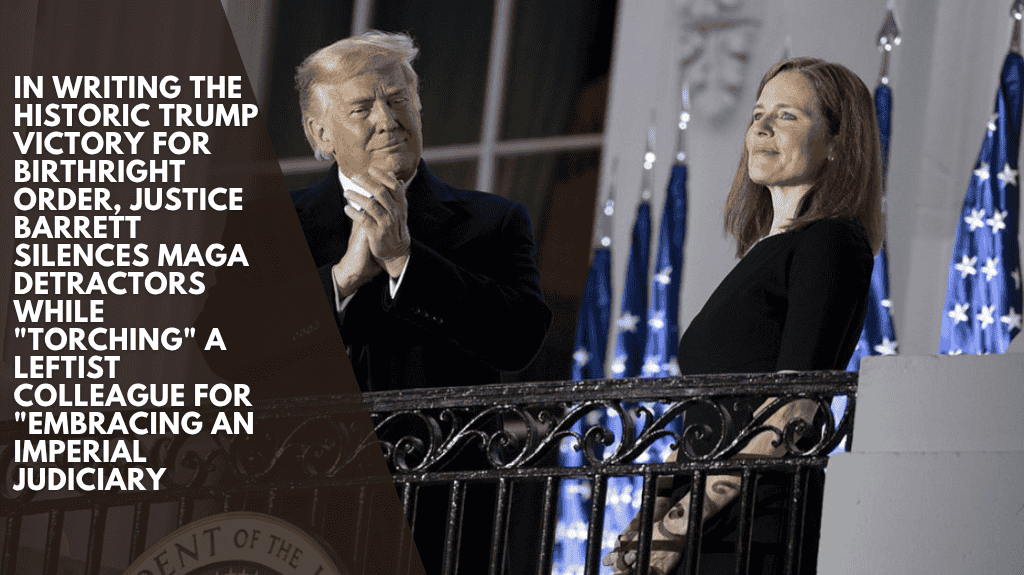The United States Supreme Court handed the Trump administration a significant legal victory on Friday by severely limiting federal judges’ ability to grant nationwide injunctions against the president’s policies.
The victory also appears to have silenced many outspoken critics of Justice Amy Coney Barrett, who wrote the majority opinion that will allow the administration to begin implementing its policy aimed at ending birthright citizenship by narrowing the scope of the numerous nationwide injunctions halting the controversial measure.
Barrett had been targeted by MAGA acolytes for siding with the liberal bloc of justices on several previous issues, prompting many of the president’s staunchest supporters to mock her appointment to the Supreme Court.
In a 6-3 vote that split along ideological lines Friday, the court granted the Trump administration’s request to limit district court judges’ ability to stymie the president’s political agenda by ruling that “universal injunctions likely exceed the equitable authority that Congress has given to federal courts.”
“Government’s applications for partial stays of the preliminary injunctions are granted, but only to the extent that the injunctions are broader than necessary to provide complete relief to each plaintiff with standing to sue,” Barrett wrote in the order, which measured 26 pages.
The justices did not address the constitutionality of Trump’s executive order on birthright citizenship, but they did allow the administration to begin taking steps to implement the policy, which could be partially implemented in 30 days.
The order, signed on Trump’s first day in office, directs the secretary of state, attorney general, secretary of homeland security, and social security commissioner to stop recognising citizenship for children born in the United States whose parents are either illegally present or legally present but only temporarily.
Legal experts overwhelmingly believe it is unconstitutional and contradicts more than a century of Supreme Court precedents.
According to the ruling, federal judges will typically be limited to granting relief only to the plaintiffs — individuals or groups — who filed a specific lawsuit. This means that the named plaintiffs in the current consolidated lawsuit will continue to be protected by lower court injunctions, but those without legal representation will not.
“Prohibiting enforcement of the Executive Order against the child of an individual pregnant plaintiff will give that plaintiff complete relief: Her child will not be denied citizenship,” said Barrett. “Extending the injunction to cover all other similarly situated individuals would not render her relief any more complete.”
Barrett’s order did not entirely prohibit universal injunctions, especially in cases where states sue the federal government. However, the court was ambiguous about how such issues should be resolved.
“The complete-relief inquiry is more complicated for the state respondents because the relevant injunction does not claim to directly benefit nonparties.
Instead, the District Court for the District of Massachusetts determined that a universal injunction was required to provide the States with complete relief,” the order states.The government, unsurprisingly, sees things differently.
It responds that, even if the injunction is intended solely to benefit the States, it is “more burdensome than necessary to redress” their alleged damages. After all, saying that a court can grant complete relief does not imply that it should do so.
The court eventually “decline[d] to take up these arguments,” instead directing the lower courts to “determine whether a narrower injunction is appropriate,” adding, “we therefore leave it to them to consider these and any related arguments.”
Barrett also got personal, criticising Justice Kentanji Brown Jackson and her dissent in the case. Jackson wrote that the majority’s decision “to permit the Executive to violate the Constitution with respect to anyone who has not yet sued is an existential threat to the rule of law.”
Barrett describes Brown’s belief that “the fundamental role of courts is to ‘order everyone (including the Executive) to follow the law — full stop,'” as “startling” and “tethered neither to these sources nor, frankly, to any doctrine whatsoever.”
Barrett continued:
We will not dwell on Justice Jackson’s argument, which is at odds with more than two centuries’ worth of precedent, not to mention the Constitution itself. We observe only this: Justice Jackson decries an imperial Executive while embracing an imperial Judiciary.
No one disputes that the Executive has a duty to follow the law. But the Judiciary does not have unbridled authority to enforce this obligation — in fact, sometimes the law prohibits the Judiciary from doing so.
The personal rebuke earned Coney Barrett a lot of praise from MAGA influencers, with many claiming that the conservative justice effectively “torched” her liberal counterpart.
Justice Sonia Sotomayor also wrote a dissent, which was joined by Brown and Justice Elena Kagan, warning that “no right is safe in the new legal regime that the Court creates.”
“The majority holds that, absent cumbersome class-action litigation, courts cannot completely enjoin even such plainly unlawful policies unless doing so is necessary to afford the formal parties complete relief,” the justices wrote. “That decision makes constitutional guarantees meaningful only in name for individuals who are not parties to a lawsuit. I will not be complicit in such a serious attack on our legal system, so I dissent.”












